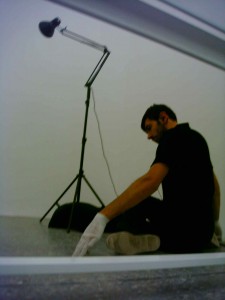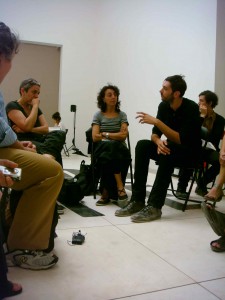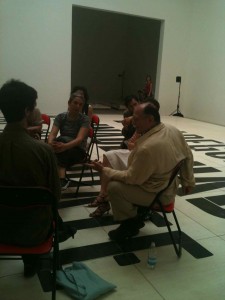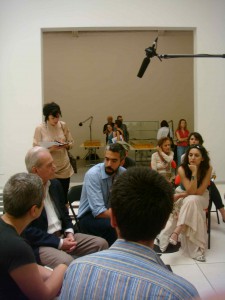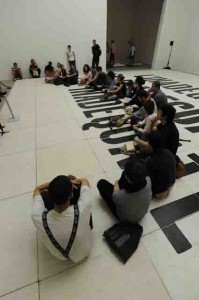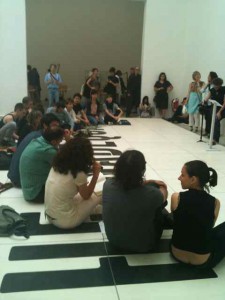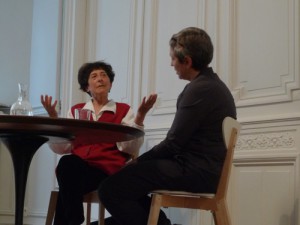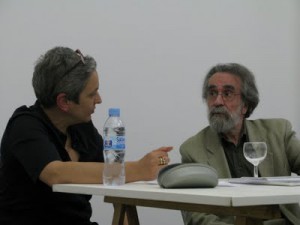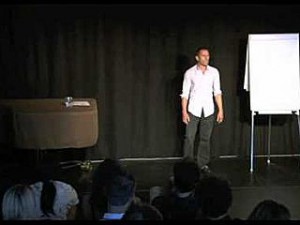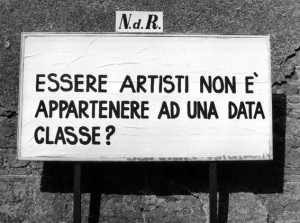Last Saturday June 4, we learnt that the first Monday of Biennale, Monday June 6, the Biennale was open. No news about it in the internet site, no information from the organizers (Biennale), no information from the commissioners (Aecid). We just did not know. I have to say, the exhibition structure of the Venice Biennale is much worse organized, or functioning, than an art center in the provinces of Spain. I have been in neighbourhood cultural centers in Valladolid that function in a far more efficient manner. This is chaos from beginning to end. Everything is made, and badly, for the four opening days. The other six months things are just left to rot. Continue reading ‘June 6: Day of avantgarde and embarrassment.’
June 4 and 5
As can clearly be seen in this slightly desolate blog of The Inadequate, things happen faster than they are told. Davide Savorani came June 4, and since then, as you see in the picture, has been working in the space of the Spanish Pavilion, in a low profile, silent and efficient manner. The same day Piergiorgio Giacchè was the protagonist of a two hour conversation around Carmelo Bene, full of anecdotes and humor: on theater, audiences, critics (Carmelo Bene famously never allowed critics who reviewed him negatively to enter again one of his plays- food for thought, I thought!), politics, Pasolini, and everything in general. Carmelo Bene never addressed the audience, he never played “horizontal”, but always “vertical”, direction heaven, not in vain he wrote a whole play about a flying priest. For Bene, the most interesting characteristic of St. Joseph, the flying priest, was his imbecility—he quips that Joseph was so stupid he didn’t even know the law of gravity- St Joseph he could not close his mouth, and thought escaped through it. Thought, according to Carmelo Bene, is what stops us from flying.
We have no picture of the conversation with Giacchè, so this one belong to Davide Savorani. The day after, June 4, Walter Siti came to converse on exclusion and Pier Paolo Pasolini, together with Barbara Casavecchia, Eva Fabbris, Vincenzo Latronico and myself. Again a two hour long conversation full of anecdotes and brilliancy. No translation (Italian) no amplification (get close to the speaker) and no recording (you had to be there or someone has to tell you about it). Walter Siti had a very specific view on Pasolini, a de-mystifying one, a petit bourgeois who needed to disappear in a different dimension at night to certify he was alive. Two great sentences by Pasolini: “Bourgeoisie is not a social class, is a disease, and I regularly try to cure myself from it” – translated from the Italian by me, hope is accurate- and: “I love reality, but I hate truth”.
Nanni Balestrini was the first conversation held in the Spanish Pavilion in Venice within the project The Inadequate. This is chapter 8 in the guide (/performanceguide/)
Nanni Balestrini spoke within the category of “Language”. He is a poet, first and foremost, an artist, a witness (as he says) of history, a writer, and certainly an inspiration for this project. The conversation was led by Marco Baravalle. People had to get very close to him as there is no translation, no amplification, and no recording of the conversation; it is a real conversation. This happened as well the day after the “official opening” and therefore it was the first real day of The Inadequate, without ministers (always welcome, but hard to concentrate with them) and without hysteric crowd, more or less.
We spoke how else, about “Vogliamo tutto” (We want everything), his portrait of a new type of working class young man in the Italy of the seventies, one who refused (an important word in this project) to comply with both the exigencies of the patrons, and with the ideology of the communist party, a partyless political figure of youth and revolt who simply could not accept a lifetime of alienating and idiotic work. But also, a book written in the first person, stream of consciousness modus, divided in paragraphs without chapters and without plot progression. About 10 people participated in the conversation.
Featuring: Real Artists Don’t Have Teeth,
The Essential Lenny Bruce, and
Best Regards From Charles Filch – and some of the collective reading of Antonio Moresco “Letters to No One”.
June 2
Collective reading by Italian artists (Simone Berti, Rossella Biscotti, Dafne Boggeri, Monica Bonvicini, Claire Fontaine, C.C. Donzella, Luca Francesconi, Motel Lucie, Giancarlo Norese, Adrian Paci, Giulia Piscitelli, Moira Ricci) of Lettere a nessuno (Letters to No One) by Antonio Moresco. Hosts: Barbara Casavecchia with Vincenzo Latronico
Pendant cette rencontre Dora García a interrogé Esther Ferrer sur sa trajectoire artistique et ses positions politiques et artistiques de l’époque du franquisme à aujourd’hui. Il a aussi été question de sa position d’artiste « en exil » ou plus précisément d’artiste “déplacée” de l’Espagne vers la France dans les années 60. Esther Ferrer a évoqué ses relations personnelles avec quelques figures des avant-gardes intellectuelles dans les années 70 tel que David Cooper et la pensée Française avec Michel Foucault et Jacques Lacan. Autre aspect de cette rencontre : en tant qu’artistes représentant l’Espagne à la Biennale de Venise (en 1999 pour Esther Ferrer, en 2011, cette année donc, pour Dora Garcia) comment gérer la relation à l’Etat et à ses modes de fonctionnement institutionnels et politiques ?
Plateforme d’édition et de création contemporaine
www.rosascape.com
http://lttds.blogspot.com/2011/04/conversation-between-dora-garcia-and.html
Last night, a fascinating conversation between Dora García and Isidoro Valcárcel Medinatook place at ProjecteSD, Barcelona, coinciding with the opening of the exhibition Forever, which featured works by both artists as well as Joe Scanlan.
García led the dialogue which began around the concept of the over-excluded or thesuper-excluded artists in relation to Pierre Bal-Blanc’s 2009 Secession exhibition and essay ‘The Death of the Audience’ (interview with the author here). Besides talking about this long-term interest of García around ‘the marginal’, the artists also discussed the role and sense of mission attributed to artists, censorship (and self-censorship), what it means to work ethically (or the ethics of work), the definition of quality and regret.
One of the highlights was this short exchange:
– Dora García: Do you identify with the idea of an artist without work?
– Isidoro Varcárcel Medina: Is that possible?
– DG: Well, there’s a few examples in history…
– IVM: With or without a catalogue…?
DORA GARCIA – Echte Künstler haben keine Zähne · 22.08. – 22.08.2010
Kunsthalle Bern
Das Ein-Personen-Stück Echte Künstler haben keine Zähne ist Teil des Projektes Mad Marginal der renommierten spanischen Künstlerin Dora García, in welchem sie sich mit Marginalität als einer politischen und künstlerischen Haltung auseinandersetzt. Continue reading ‘The prehistory of The Inadequate: Echte Künstler haben keine Zähne’
As a protagonist of post-conceptual and refusal art in Italy from the end of sixties, I would to remenber to you that, in 1973, I founded “Arte-Dialettica” with Francesco Matarrese and I actively participated at the art manifestations organized by the “Ufficio per l’immaginazione preventiva”, both presents in the extraordinary idea of Inadequate. Continue reading ‘Arte-Dialettica’


